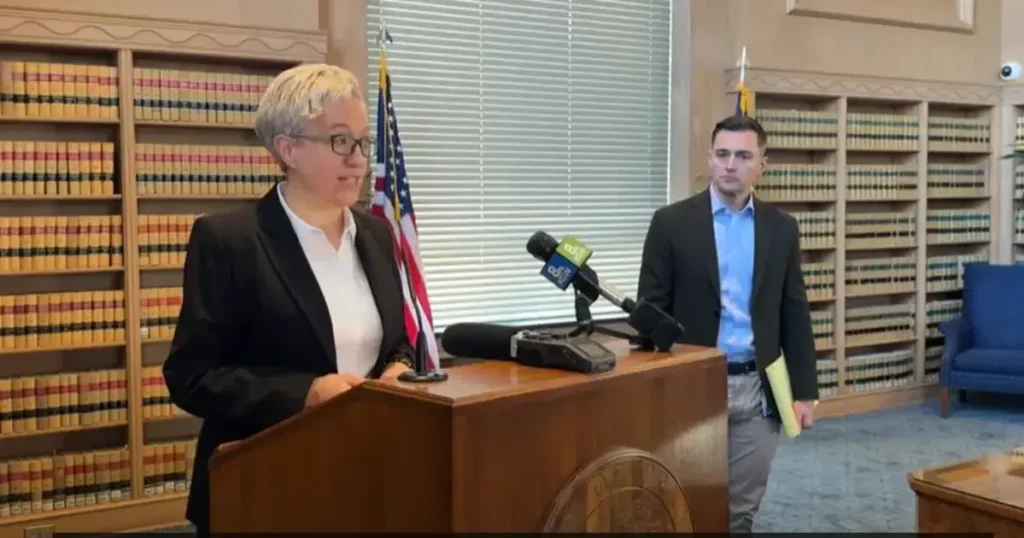
It is not a coincidence that the federal government opened the spending spigot in 2020 – first in the name of Covid and forest fires, and eventually under the more durable banners of equity and climate change – and that same year was the inflection point at which Oregon began its nose dive into cellar dwelling status. Free-flowing federal funds are at once the object of my state government’s obsession, and the substance that is killing it.
Democratic Governor Tina Kotek is not easily roused to address Oregon’s usually compliant news media since she held a dishonest disaster of a press conference last year intended to bury the scandal of her stealth elevation of her wife to a leadership role in her administration. But news this week that the Trump administration was pausing some federal spending, along with the temporary unavailability of online portals through which Oregon and other states obtain reimbursement for Medicaid and other programs, caused Kotek to veritably sprint to the lectern to decry the delay.
On the other side of the country, U.S. Senator Ron Wyden (D-OR), the godfather of Oregon Democratic politics, i.e. Oregon politics, complained about federal funding delays during Robert F. Kennedy Jr.’s confirmation hearing.
Kotek and Wyden have good reason to fear a slowdown in federal largesse flowing to the Beaver State. The political machine over which they preside relies on a growing money pie to split among its many patrons.
The one thing the government of the state of Oregon does well, the task for which it is optimized, is the distribution of resources from state coffers to political allies who in turn use some of the lucre to keep the money flowing. This takes the form of direct campaign contributions to the Democrats who run the state, as well as a kind of messaging and cultural subtext designed to prop up the status quo and punish those who may stray from it.
The problem is, the people of Oregon do not generate enough tax revenue on their own to satiate the ever-growing appetites of the public sector unions and nonprofits that feed the machine. Oregonians, as a whole not an especially wealthy group of people, pay a big percentage of their incomes in taxes, and the state is constantly looking for ways to increase revenue from within the state, but even Oregonians have a limit to what they will charge themselves for the privilege of living here.
And that’s where the federal money comes in. Oregon, like other states, must balance its budget. The federal government very obviously does not, to the tune of a $36 trillion national debt.* When the federal government began spinning the currency presses in earnest in 2020, Oregon had the hookup it needed to really let ‘er rip.
And rip it did. The share of Oregon’s budget satisfied by federal spending, increasing for decades, leapt in 2020 to exceed the contribution from Oregon’s own tax-derived general fund. The federal surge continued in through 2023, and has only just leveled off during the 2023-2025 budget cycle as some, but not all, straining-the-definition-of-temporary Covid funds finally dried up. Federal funding is now about what it was in the 2019-2021 budget, which of course encompassed Covid.

Far from helping Oregonians, the federal spending spike probably made things worse. As reported by The Oregonian, Oregon schools received “more than a billion dollars in federal pandemic aid” en route to attaining among the worst math and reading test scores in the country according to federal data released last week. The Urban Institute adjusted the scores for a state’s demographics, and Oregon came in dead last.
And it’s not just education funding. Oregon measures near the bottom of a wide range of indicators of addiction, mental health, transportation and other areas where the federal government gives gobs of money to states.
It turns out pumping more money through the Oregon political machine helps perpetuate the machine, but it does nothing to help Oregonians. Don’t look for that dynamic to change under the state’s current leadership. After all, Kotek, who also is the superindentent of public education in Oregon, held a press conference about a pause in federal spending, not the abject failure of the schools she oversees.
*In 1995, Oregon Republican Senator Mark Hatfield cast the deciding vote against a constitutional amendment to require the federal government to balance its budget, helping lay the groundwork for his state’s current plight.
This article originally appeared in the Oregon Roundup. Click here to join the conversation on this important article.
